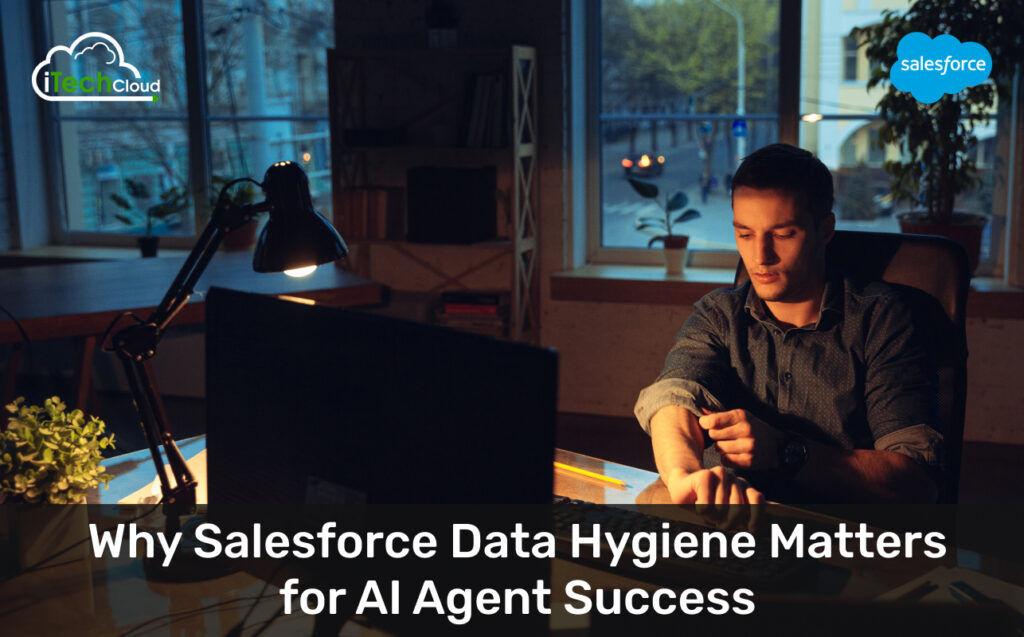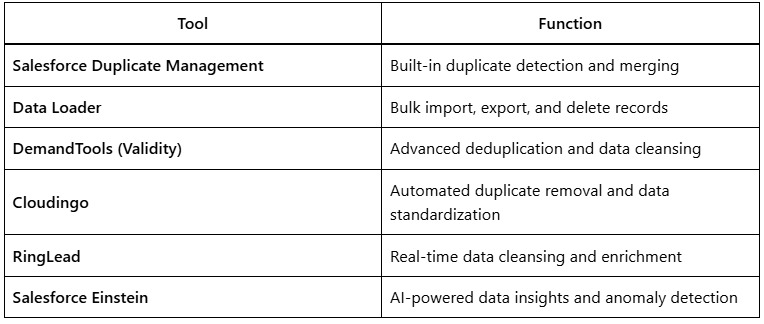Why Salesforce Data Hygiene Matters for AI Agent Success

Introduction
Artificial intelligence (AI) is transforming how businesses operate, and AI-powered agents are at the forefront of this revolution. From chatbots to predictive analytics, AI agents rely on high-quality data to function effectively. However, even the most advanced AI models can fail if the underlying data is inaccurate, incomplete, or inconsistent.
Salesforce, as one of the world’s leading Customer Relationship Management (CRM) platforms, serves as a critical data hub for many organizations. Ensuring data hygiene clean, structured, and reliable data is essential for AI agents to deliver accurate insights, automate workflows, and enhance customer experiences.
Table of Contents
1. What is data hygiene in Salesforce?
Data hygiene refers to the processes and practices that ensure data is accurate, consistent, and usable. In the context of Salesforce, it involves
- Duplicate Management – Preventing and merging duplicate records.
- Data Standardization – Ensuring uniformity in naming conventions, formats, and fields.
- Validation Rules – Enforcing correct data entry through validation rules.
- Regular Audits – Periodically reviewing and cleaning outdated or incorrect data.
- Integration Quality – Ensuring data imported from other systems is clean and properly mapped.
Poor data hygiene leads to “garbage in, garbage out” (GIGO), where flawed input data results in unreliable AI outputs.
2. The Role of AI Agents in Modern Business
AI agents are software programs that perform tasks autonomously, often using machine learning (ML) and natural language processing (NLP). Common AI agents in business include:
- Chatbots & Virtual Assistants – Handling customer inquiries in real time.
- Predictive Analytics Tools – Forecasting sales trends and customer behavior.
- Lead Scoring Systems – Prioritizing high-value prospects.
- Automated Workflows – Streamlining approvals, notifications, and task assignments.
These AI agents depend on clean, structured data to:
- Understand user intent (e.g., chatbots interpreting customer queries).
- Make accurate predictions (e.g., forecasting revenue based on historical data).
- Personalize interactions (e.g., recommending products based on past purchases).
If the underlying Salesforce data is flawed, AI agents will produce unreliable results, leading to poor decision-making and customer dissatisfaction.
3. How Poor Data Hygiene Impacts AI Performance
A. Inaccurate Predictions & Recommendations
AI models trained on dirty data will generate misleading insights. For example:
- A lead scoring model may prioritize the wrong prospects if contact details are outdated.
- A recommendation engine might suggest irrelevant products due to incorrect customer purchase history.
B. Poor Customer Experiences
- Chatbots may fail to resolve issues if customer records are incomplete.
- Automated emails might be sent to wrong or inactive addresses.
C. Wasted Resources & Lost Revenue
- Sales teams waste time chasing dead leads.
- Marketing campaigns underperform due to incorrect segmentation.
D. Compliance & Security Risks
- Storing outdated or incorrect customer data can violate GDPR, CCPA, and other regulations.
- AI-driven fraud detection systems may fail if transaction records are inconsistent.
4. Key Data Hygiene Challenges in Salesforce
A. Duplicate Records
- Multiple entries for the same customer lead to confusion and inefficiency.
- AI agents may treat duplicates as separate entities, skewing analytics.
B. Incomplete or Missing Data
- Blank fields in contact records prevent AI from generating useful insights.
- Missing sales history disrupts forecasting accuracy.
C. Inconsistent Data Formats
- Dates, phone numbers, and addresses entered in different formats cause errors.
- AI struggles to interpret unstructured or improperly categorized data.
D. Outdated Information
- Old email addresses, job titles, and company details lead to failed engagements.
- AI models trained on obsolete data produce irrelevant recommendations.
E. Poor Data Integration
- Importing messy data from external sources (e.g., spreadsheets, legacy systems) without cleansing.
- Mismatched field mappings between Salesforce and other platforms.
5. Best Practices for Maintaining Clean Data
A. Implement Data Governance Policies
- Define data ownership and accountability.
- Establish clear data entry standards (e.g., required fields, naming conventions).
B. Use Salesforce Duplicate Management Tools
- Enable duplicate rules and matching rules to prevent duplicates.
- Regularly merge duplicate records using Salesforce Data Loader or third-party apps.
C. Enforce Validation Rules
- Require specific formats for emails, phone numbers, and dates.
- Block incomplete records from being saved.
D. Schedule Regular Data Cleansing
- Conduct quarterly data audits to remove outdated records.
- Use AI-powered data cleansing tools (e.g., DemandTools, Cloudingo).
E. Train Teams on Data Entry Best Practices
- Educate sales and marketing teams on the importance of clean data.
- Encourage using picklists and standardized fields instead of free-text entries.
F. Automate Data Hygiene with AI
- Use Salesforce Einstein to detect anomalies and suggest corrections.
- Implement AI-driven deduplication and enrichment tools.
6. Tools and Automation for Data Hygiene

Automating data hygiene reduces manual effort and ensures continuous accuracy.
7. Real-World Benefits of Clean Data for AI Agents
A. Improved AI Accuracy
- Chatbots provide faster, more relevant responses.
- Predictive analytics generate reliable forecasts.
B. Customer Engagement
- Personalized recommendations increase conversion rates.
- Automated workflows run smoothly without errors.
C. Higher Operational Efficiency
D. Stronger Compliance & security.
- Reduced risk of regulatory penalties.
- AI-powered fraud detection works effectively.
8. My Takeaway: Salesforce Data Hygiene Matters for AI Agent Success
As AI agents become more integral to business success, Salesforce data hygiene will be a key differentiator. Organizations that prioritize clean, structured data will unlock:
- Smarter AI-driven decisions
- More personalized customer experiences
- Higher productivity and revenue growth
Investing in data governance, automation, and continuous cleansing ensures that AI agents operate at peak performance. The future belongs to businesses that treat data as a strategic asset not an afterthought.

